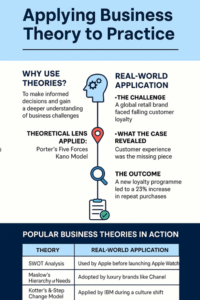
In this blog:
In business studies, there is a key link between theory and dealing with actual challenges. That link is a case study. Case study analysis is now an integral part of business studies that gives students both practical understanding and strategic thinking.
Whether it’s an MBA or a Doctorate in Management, breaking down actual business situations to analyse gives you the opportunity to translate what you learn at school to boardroom and shop floor decisions around the globe.
We will discuss here how case study analysis facilitates the connection of theoretical frameworks to actual business decisions, and why it is at the very heart of contemporary management education.

Case studies provide rich, in-depth stories based on real business scenarios. They force learners to analyse sophisticated challenges, take into consideration multiple stakeholder viewpoints, and apply theoretical concepts to develop implementable solutions. Business learning experts believe that case-based learning does not only improve critical thinking but also decision-making and leadership abilities.

Business theories like Porter’s Five Forces, SWOT Analysis, or Kotter’s Change Model are most effective when they are applied to real case studies.
For instance, an MBA student can employ financial concepts to realise how a struggling retail firm can turn the corner, or innovation concepts to analyse why a technology start-up was successful. Thus, learning isn’t abstract, it yields actual business outcomes.
| Theory | Real-World Application |
| SWOT Analysis | Used by Apple to reassess its strategic position before launching Apple Watch. |
| Maslow’s Hierarchy of Needs | Adopted by luxury brands like Chanel to understand emotional triggers in consumer behaviour. |
| Kotter’s 8-Step Change Model | Applied by IBM during its culture shift towards digital innovation. |
| PESTLE Analysis | Used by Unilever to assess political risks before expanding into emerging markets. |
Converting business principles into actual company solutions involves a structured process. Effective case study analysis generally involves the following steps:
Start by defining the primary business issue—whether it is market entry, operational constraints, ethical concerns, or growth planning. Then, choose which theoretical tools would be applicable.
For example:
Dissect the case to connect real-world facts to theoretical principles. Examine financial data, context, and stakeholder interests.
For example, in analysing a firm’s struggle against competitors (using Porter’s Five Forces), break down threats from new entrants, supplier/buyer power, industry rivalry, and substitute products.
Work through the chosen frameworks, justifying every decision based on both case evidence and theoretical rationale. Compare predicted and actual outcomes and discuss limitations or contextual nuances.
Present actionable conclusions, weighing the upsides, risks, and feasibility. Use findings to propose strategic moves—be it market repositioning, operational optimisation, or organisational restructuring.
Real businesses across the globe use management theories to overhaul strategy, boost productivity, and foster innovation:
For learners, working through such cases simulates boardroom realities preparing them to lead with insight, confidence, and vision.
Whether you aspire to lead a startup, manage a multinational company, or pursue academic research, case study analysis builds essential skills:
This is especially important for doctoral students, who are expected to evaluate data and make evidence-based recommendations.
Learn more: How does an executive MBA shape your leadership legacy
Programmes like the Executive MBA and Doctorate in Management offered by Exeed ECX immerse participants in rigorous, case-driven learning.
Here’s what you will gain from these programmes:
Related: How Universities are Adapting to the Changing Job Market
Business theories aren’t meant to be memorised—they’re meant to be used. And case studies offer the perfect arena for that application. The most successful professionals today are not the ones with all the answers, but the ones who can ask the right questions, connect the dots, and make decisions rooted in sound reasoning.
Whether you’re looking to upskill, switch careers, or advance in your current role, learning through cases can reshape your perspective.
🎓 Learn to Think Like a Strategist
Whether you’re starting your management journey or looking to add academic weight to your experience, consider investing in a world-class programme:
👉 Explore the MBA Programme at EXEED ECX
Pursue a Doctorate in Management